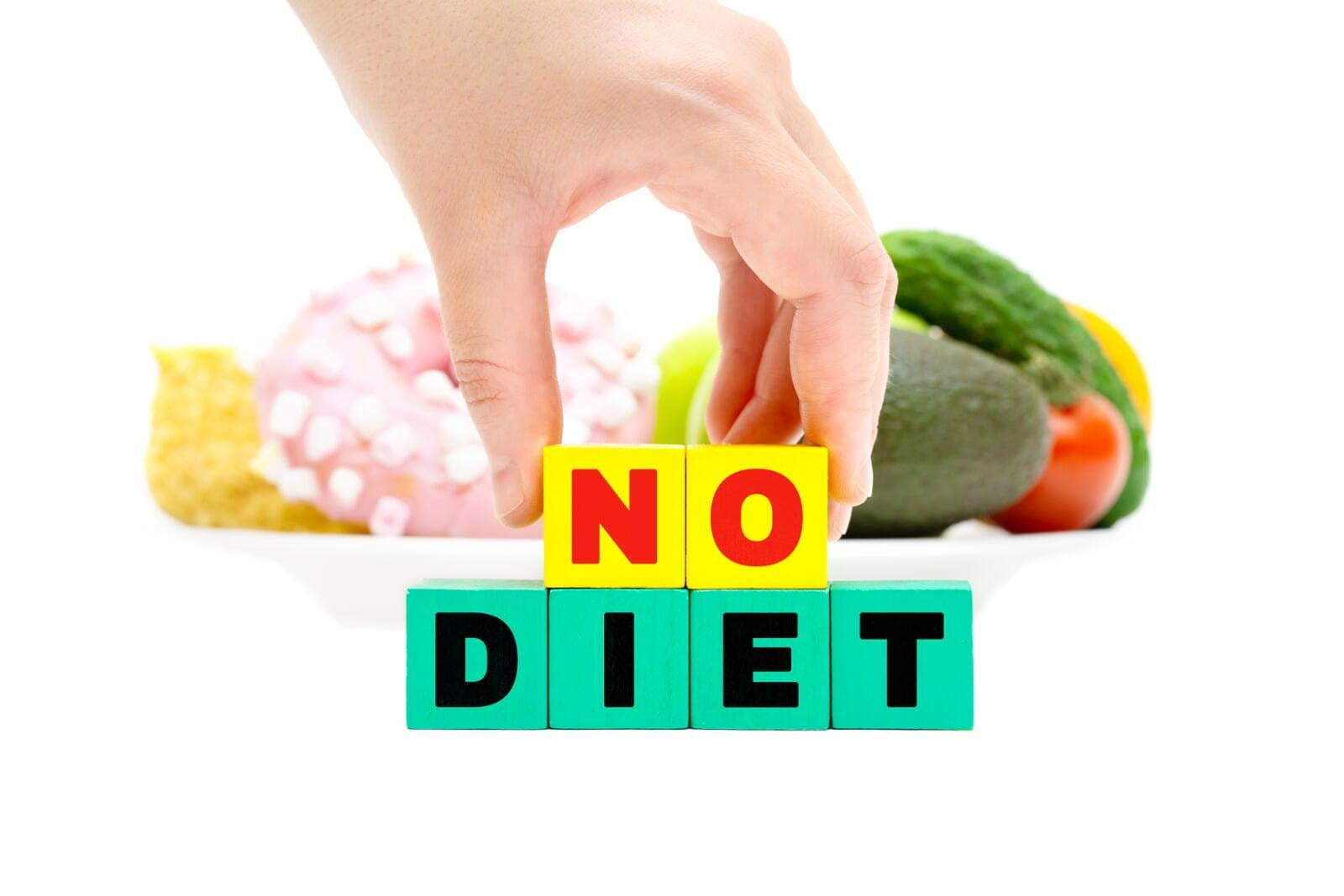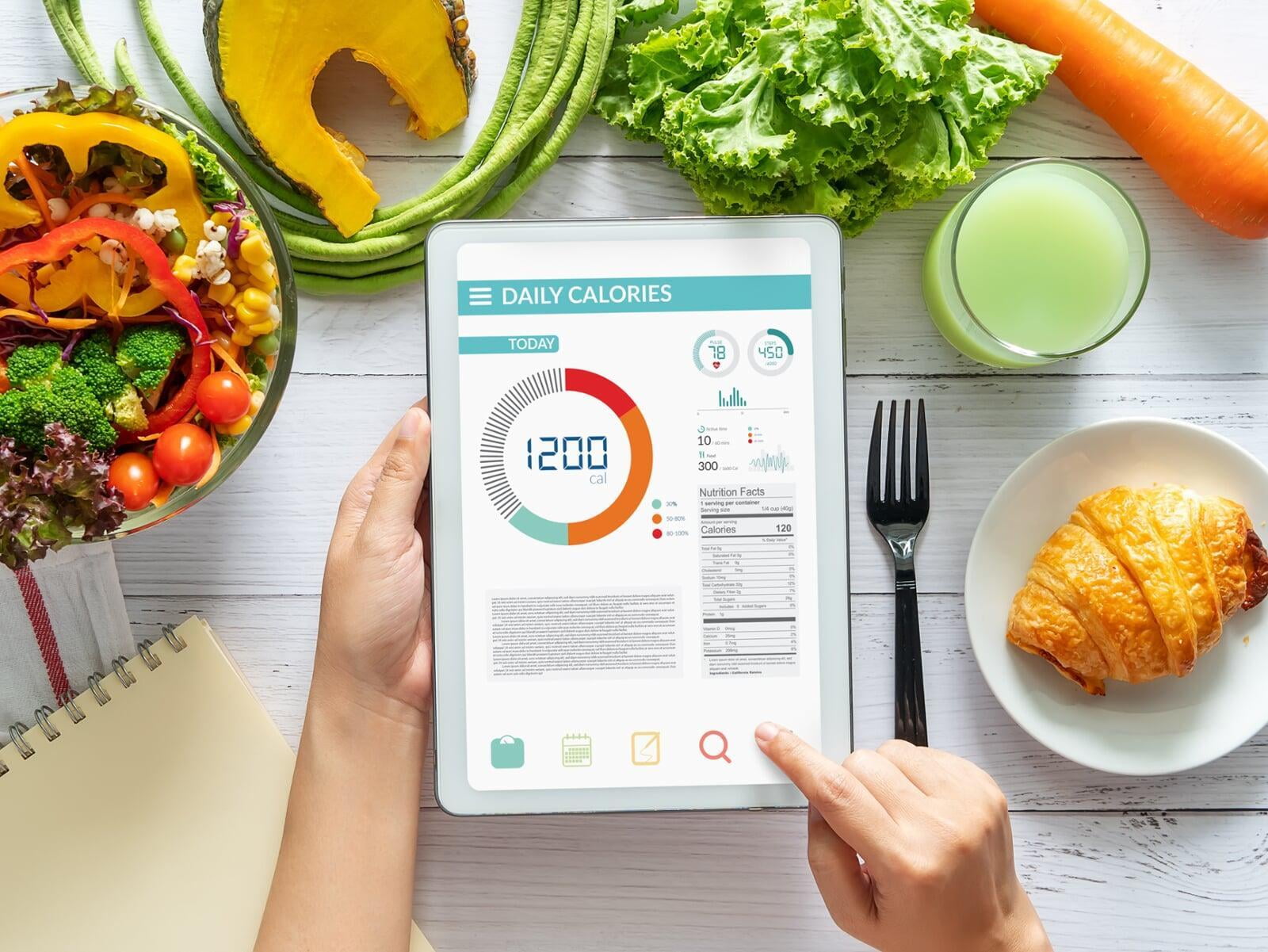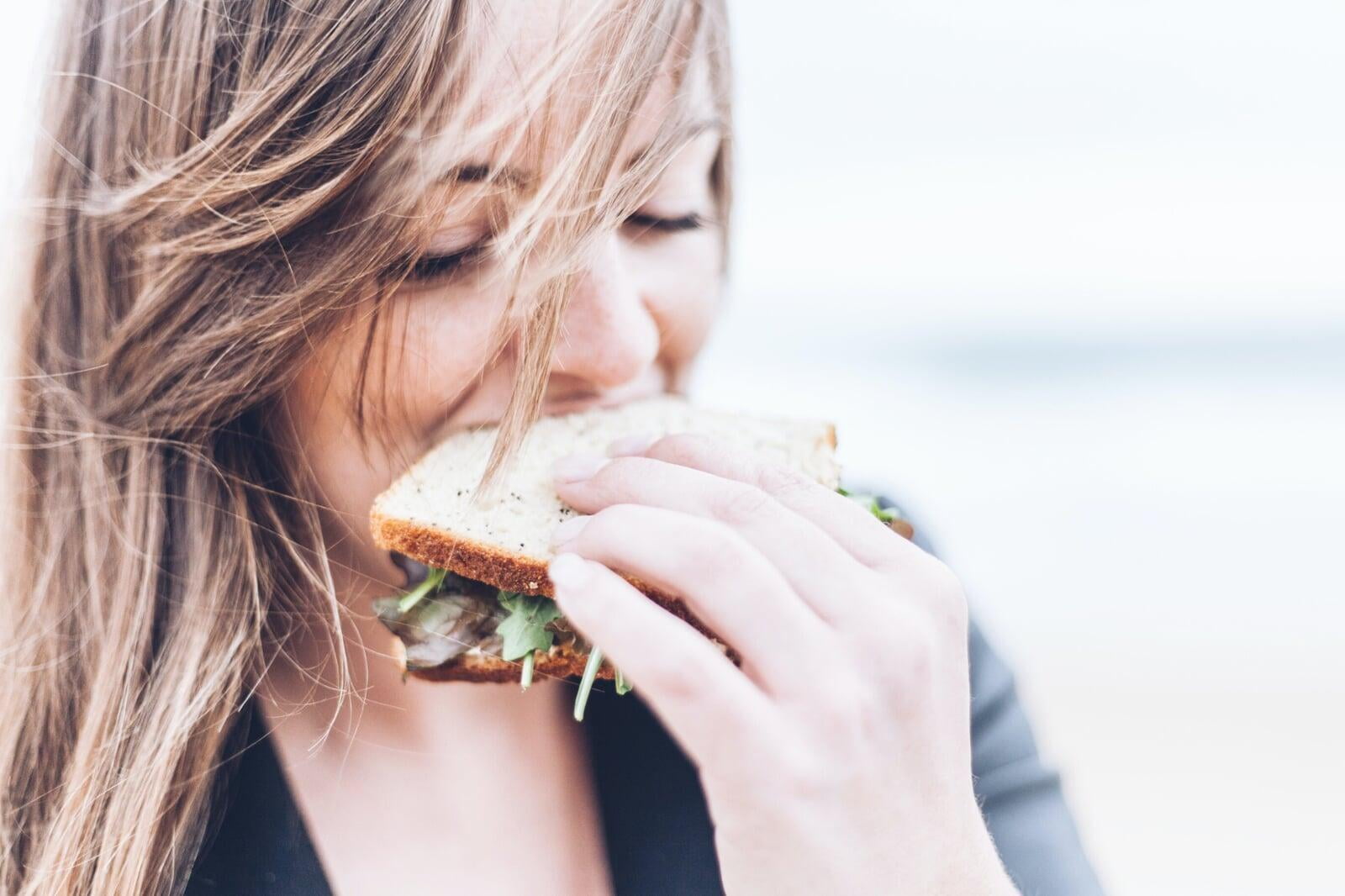My Journey from Intuitive Eating to Flexible Dieting
It’s no secret that I’m a fan of flexible dieting but what you might not realize is that I also think there is a time and a place for intuitive eating. In fact, I’m flat out going to tell you that not everyone is a good candidate for flexible dieting (aka macro counting). And not everyone is a good candidate for intuitive eating.
At one point in my early teens I was very dissatisfied and self-conscious about the shape of my body. I played sports in high school and I had what others liked to refer to as a ‘bubble butt.’ And because this was before bigger behinds were ‘in’ I didn’t appreciate my perky behind. In fact, I didn’t like it one bit. I wanted it gone.
Soon enough I figured out that food had calories and the amount of calories you took in impacted your body size. With this newfound knowledge, I became obsessed with mentally tracking every morsel of food that entered my mouth. I counted calories like my life depended on it. Mind you, this was long before food logging apps like My Fitness Pal existed. Nonetheless, I still managed to lose a lot of weight due to my heightened self-awareness around food along with hours of physical activity after school.
It wasn’t until months after I started my calorie counting journey that I realized my harmless desire to lose a few pounds had turned into a full blown eating disorder.
Is Calorie Counting to Blame for Eating Disorders?
It’s hard to pinpoint why I developed an eating disorder but I do know I can’t blame calorie counting on it. Eating disorders are complex and to say that calorie counting causes eating disorders is like saying obesity is caused by eating high fructose corn syrup. There are simply too many variables at play to say one thing causes the other. And while calorie counting can be a symptom of an eating disorder, it doesn’t mean that everyone who counts their calories has a negative relationship with food or their body.
In today’s world it’s easy to shift the blame, point your finger, and boldly claim 'x' is the cause of my problems. But I don’t jive with the victim mentality--though I could have easily gone there. And I don’t view calorie counting, macro counting, tracking food or educating yourself about nutrition is the root of all evil.
I say this because there currently appears to be a great divide between nutrition professionals. One camp of nutrition professionals adamantly opposes calorie counting (mostly those in the anti-diet and intuitive eating space) and another group promotes food tracking/self monitoring (mostly others like myself who work in the weight-loss space).

The Pros & Cons of Intuitive Eating versus Flexible Dieting (Macro Tracking)
What Is Intuitive Eating?
Intuitive eating first became popularized by dietitians’ Evelyn Tribole and Elyse Resch. In its most basic sense, intuitive eating is just what it sounds like - eating based on your intuition. In other words, letting your natural hunger and satiety cues guide your eating choices. Intuitive eating is also not meant to be a diet for weight-loss. In fact, the first principle of intuitive eating is ‘reject the diet mentality.’ That said, intuitive eating is not meant to be the holy grail for weight-loss. It was actually originally designed as an alternative method for chronic dieters to use to achieve health regardless of their shape or size.
Benefits/Pros of Intuitive Eating:
More psychologically satisfying
Greater connection with innate hunger/satiety cues
Requires minimal planning/forethought about what to eat
Eating behaviors based on enjoyment and health
Promotes body acceptance/satisfaction
Can improve relationship with food
Cons of Intuitive Eating:
Doesn’t advocate for nutrition education
May be difficult to achieve a ‘balanced’ nutrition intake without prior knowledge of food/nutrient composition
Provides no road map for those with body composition goals
May have a tendency to under eat or overeat
Large learning curve involved
What Is Flexible Dieting?
Macro counting on the other hand was originally used in the body building and sports world to enhance performance and achieve body composition goals. Unlike intuitive eating, macro counting requires you to eat based on your macro targets (an estimate of the number of grams of protein, carbs, and fat) which are developed based on whether you want to gain muscle, lose fat, or improve your athletic performance. While there are no foods that are off limits with flexible dieting, it can be difficult to achieve your macronutrient goals without a high degree of adherence to eating mostly whole foods. To ensure you hit your macronutrient targets, it requires that you track your food intake throughout the day and adjust your intake based on your specific macro goals.
Benefits/Pros of Macro Counting:
May be more physically satisfying because you are focusing on eating an ample amount of protein and high fiber foods (both physically satiating)
Ensures a balanced distribution of macronutrients
Educates on nutrient density of foods and portion sizes
Eating behavior guided by macro targets
Cons of Macro Counting:
Requires more planning/forethought about what to eat
Requires additional time out of your day to track
Difficult to track foods while dining-out and track meals prepared from scratch
Can become overly fixated with hitting macro targets
Diet may be inadequate in micronutrients if quality of macronutrients isn’t prioritized

Okay, So Which One Should I Try?
As you can see the approach to intuitive eating and macro counting is very different. On one hand, intuitive eating is a fairly relaxed approach to eating, whereas macro counting is much more strict because body composition goals are at play.
Basically intuitive eating says ‘follow your instincts’ whereas macro counting says ‘stick to your macro goals.'
Choosing to follow macro counting or intuitive eating or even a blend of both approaches (more on that later) depends on several factors including:
Current Relationship with Food & Body
- Intuitive Eating Might Be Right - If you are striving to make peace with food and your body due to years of chronic dieting whether it be restricting and/or bingeing.
- Flexible Dieting Might Be Right - If you have a healthy relationship with food but want to fuel your body in a way that will promote fat loss, muscle gain or even improve your performance in the gym.
- Intuitive Eating Might Be Right - If you prefer to base most of your decisions on your 'gut' feeling/intuition
- Flexible Dieting Might Be Right - If you like to utilize data and analysis in your decision making process and have an affinity for math and numbers.
- Intuitive Eating Might Be Right - If you battle with cycles of binging followed by restriction and want to get to a place where you can trust your body with making the right eating choices regardless of whether you lose weight or not.
- Flexible Dieting Might be Right - If you have a healthy relationship with food but want fuel your body in way that will promote fat loss, muscle, gain or even improve your performance in the gym.

Can Flexible Dieting & Intuitive Eating Co-Exist?
Simply because you try one way of eating doesn’t mean that you can’t try something else. Our health and relationship with food, exercise, and our body is constantly evolving.
I have come full circle with my approach to eating and nourishing my body.
At one point I obsessively focused on calories and was fearful of eating any food that had over 5 grams of fat. I then switched to intuitive eating while working with a therapist to restore my relationship with food and my own body.
Fast forward to today, and I’ve made peace with food, my inner critic (enneagram 1 here), and calorie counting as a form of self-punishment. I now use flexible dieting to achieve my own health/performance goals while also using it with many of my weight-loss clients.
And do you want to know a secret? Sometimes I count my macros and sometimes I intuitively eat.
You may be thinking ‘But Alisa, how can you do both when they are seemingly at odds with one another?’
Because you prefer one way of eating, doesn’t mean you can’t fit principles of another dietary philosophy into your lifestyle.
Macro tracking and intuitive eating need not be mutually exclusive when it comes to pursuing health (at least for me).I know that might come as a shocker but not everything has be black or white when it comes to health and the decisions we make.
I’m happy with my weight and my body composition but also want to maintain what I worked hard to achieve. This means I have to possess a certain level of self-awareness and discipline with my food choices to maintain my goals. This is accomplished through tracking my macros.
At the same time, I want to enjoy life. When I’m on vacation or having dinner with friends - being connected with friends or family and enjoying the moment trumps being immersed in my Food Logging App to figure out the calories in my margarita.
Ultimately, I see the value of macro tracking and learning about the nutrient density of foods including both the nutrient gaps and excesses I have in my own diet.
I also see the value of intuitively eating and not ‘weighing’ (no pun intended) every food choice based on whether it’s aligned with my macro targets.
We are a culture of extremes but I for one don’t like to pick sides. I like to select the ideas that make most sense to me based on my goals and discard the rest.
6 Ways I 'Flex' Flexible Dieting & Intuitive Eating Work For Me
Eat If You are Hungry - Just because you are counting your macros/calories doesn’t mean you need to completely disregard your innate hunger/fullness cues. There are times when you will work out a little harder and feel hungrier. Hunger shouldn’t be feared, hunger should be met with food. But that doesn’t mean to necessarily give yourself the “permission” to down a pint of ice cream. One way to test if you are physically hungry versus giving into a craving is ask yourself "am I hungry enough to eat an apple." If the apple doesn't sound good, then you are likely dealing with a craving not true hunger.
Stop When you are Full - When macro counting there might be some days when you simply don’t have an appetite. For example, a few days before my cycle starts food doesn’t sound great because I'm feeling extremely bloated. So do I stuff myself with additional chicken for the sake of hitting my protein goal? Nope. There is such a thing as listening to your body while macro tracking. I see macro tracking as a tool for making better eating decisions it is not the end all be all.
Respect Your Body - One of the principles of intuitive eating is to respect your body versus criticize it. I wholeheartedly agree with this but also believe that wanting to change your body doesn't equate with hating the body you have. You can be at peace with your body while still pursuing aesthetic goals.
I Don’t Subscribe to ‘IIFYM' ( If It Fits Your Macros) Mantra, if that means disregarding the quality of the food you eat in order to hit the correct quantity of macronutrients. I never ever would recommend a client use 20 grams of carbs left in their macro budget for gummy bears for the sake of hitting their macro targets. Both quality and quantity is equally important.
Calories Still Matter - Flexible Dieting may have led you to believe that your macronutrient balance matters more than calories. However, if weight gain or fat loss is your goal - you can’t ignore the role calories play. If you are consuming more calories than you are burning, you will gain weight. And the opposite is true, as well. Calories are still king when it comes to weight management goals.
Discover the Satisfaction Factor - Because you are tracking your food doesn’t mean you need to subsist on steamed broccoli and grilled chicken - meal after meal. Eating is meant to be pleasurable (after all we have taste buds), you can still make room for your favorite foods and stay on track with your goals.
If you found today's post insightful, I'd love to hear what resonated with you most.
Do you think intuitive eating and flexible dieting can co-exist? Why or why not?
Drop me a line below and share this post with a friend